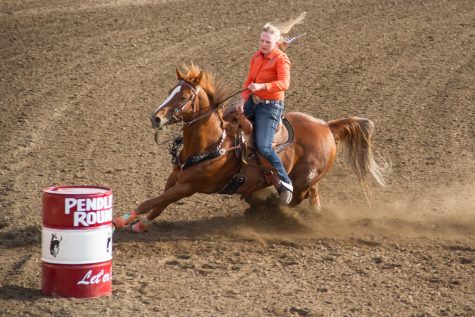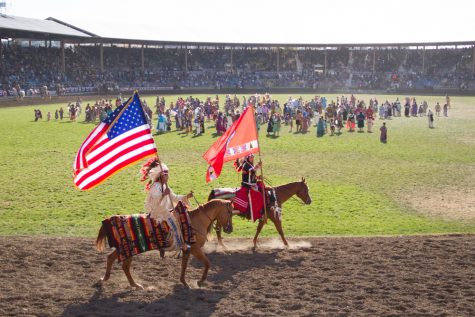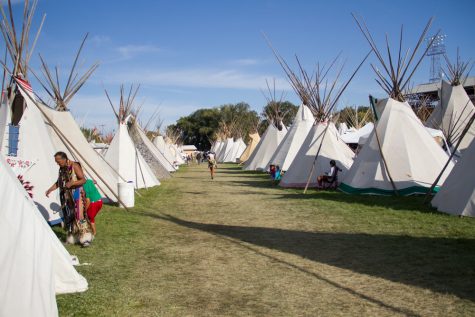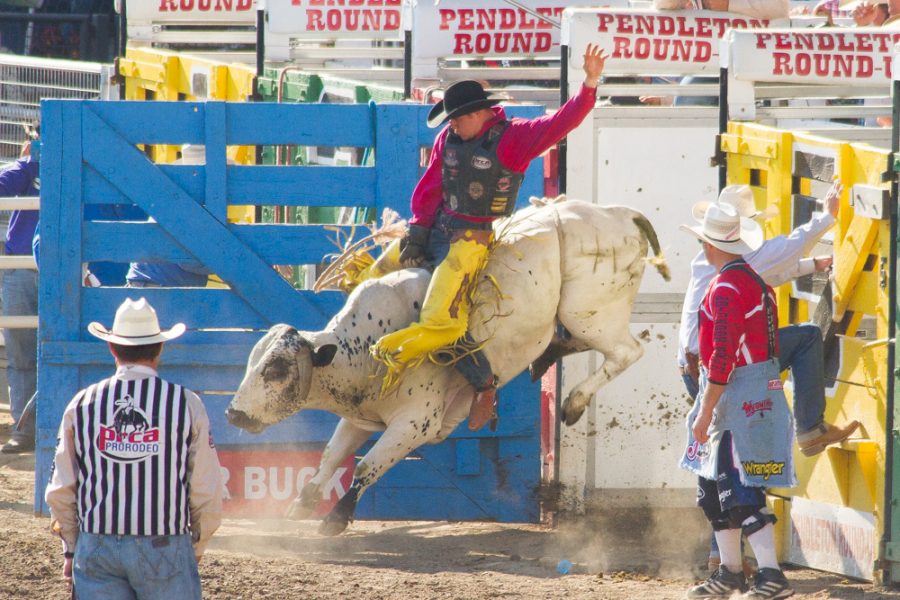Head Down to the Round-Up
September 22, 2016
Cowboy hats and country music: the two things that many Whitman students initially envision when picturing the Pendleton Round-Up. Upon visiting, however, one realizes that the Round-Up is a significant cultural celebration for rodeo fans and local Native Americans alike.
The Pendleton Round-Up is an annual rodeo festival held in Pendleton, Oregon. As one of the premier rodeos in the United States, the Round-Up draws yearly crowds of over 50,000 people. This year’s 106th anniversary Round-Up took place September 14-17.
 While the four day event features a “Westward Ho! Parade” and “Happy Canyon Indian Pageant and Wild West Show,” the main attraction is the daily four hour rodeo. There are several horse events like bareback riding and barrel racing, as well as many cattle related events including steer roping, steer wrestling and bull riding.
While the four day event features a “Westward Ho! Parade” and “Happy Canyon Indian Pageant and Wild West Show,” the main attraction is the daily four hour rodeo. There are several horse events like bareback riding and barrel racing, as well as many cattle related events including steer roping, steer wrestling and bull riding.
The overwhelming respect everyone in the crowd has for the Round-Up is tangible. This respect is largely what sets Pendleton apart from other, equally famous rodeos. Between hefty sips of beer, a 60-year-old Round-Up volunteer named Dean stated that any prize at the Round-Up “is the most coveted award in the world of rodeo.” Dean has attended some of the Nation’s largest rodeos (Cheyenne, Tucson, etc.), but claimed that Pendleton is “the best,” and the “one that sticks out the most.”
From a sports perspective, much of Pendleton’s high reputation is due to the Round-Up’s world famous usage of a grass field in the middle of the stadium, the arena’s vast size and the event’s history.
Robin Walters, a 64-year-old rodeo veteran from Norman, Oklahoma claimed that Pendleton in particular “gives a glimpse of a lifestyle a lot of people don’t understand.” He also touched on the rodeo’s history stating that he “appreciates the tradition and local support of the Round-Up… it’s my favorite one right here.”
However, a great deal of respect for the Round-Up can be attributed to the high involvement in the event by the local Umatilla, Cayuse, Nez Perce and Walla Walla Tribes. 
Native American involvement is unique for rodeos and adds to the cultural significance of the event. Madeline, a 13 year old self-proclaimed cowgirl from Colorado stated that she’s “pleased to see interaction between Natives and everyone else” and that it’s “unique for the rodeo.”
The Native American influence on the event has been crucial to the Round-Up since its conception. Many local tribes use the Round-Up as an opportunity to showcase their heritage by dressing in traditional clothing and performing songs and dances that have been passed down for generations.
The most visibly striking aspect of the weekend was the more than 300 teepees set up directly next to the stadium. The oftentimes ornately decorated teepees in the Grand Tribal Village serve as a temporary home for thousands of Native Americans that come to celebrate their culture at Pendleton every year.
 Jenny, a member of the Columbia River Yakama Nation has fond memories of the Tribal Village and believes that it serves a crucial function. Jenny “grew up at the Pendleton Round-Up” and shared that the Village allows for the “gathering of many different families and allows us to catch up and visit. It has always been that way and it allows you to represent your family.”
Jenny, a member of the Columbia River Yakama Nation has fond memories of the Tribal Village and believes that it serves a crucial function. Jenny “grew up at the Pendleton Round-Up” and shared that the Village allows for the “gathering of many different families and allows us to catch up and visit. It has always been that way and it allows you to represent your family.”
Kelly, a Pendleton resident and member of the Confederated Tribes of the Umatilla Indian Reservation has been attending the Round-Up since 1969. Kelly claimed that the event “shows what a proud people we are,” and that “everyone looks forward to participating in it every year” to display their heritage. Kelly also spoke to what a great honor it is to become the winner of the “Happy Canyon Indian Pageant.” Kelly’s sister was the Princess of the Pageant in the mid 1970s “after a huge amount of hard work” and the backing of the Tribe’s elders.
There definitely were moments at the Round-Up bound to have made many Whitman students feel uneasy. These largely came at the hands of the extremely jovial, oftentimes potentially offensive middle-aged men that narrated the rodeo. They repeatedly drew huge cheers for their snide remarks towards women, including “sometimes the best job for a man is for a woman.”
Discomfort aside, the Round-Up has made tremendous strides in recent years to promote the event as safe and family friendly, On-duty Union County police officer Butcher had nothing but positive things to say about the event’s upward trajectory in terms of safety. Butcher claimed “there were lots of fights when I first started working the Round-Up in 2003” and added that Pendleton has “done a good job of marketing the family aspect” in recent years.
No other U.S. rodeo features such a remarkable blend of incredible action, history and Native American culture. As Madeline from Colorado puts it, “There’s nobody that doesn’t know about Pendleton.”





